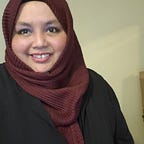DON’T MIND ME, I’M ANGRY!
Confession of a Muslim Woman — Why our Anger should be Expected and Normalized
Anger is not an emotion that is familiar to me. My go-to emotions are love, compassion, sadness, and grief. But recently, I have been feeling some kind of unease within myself.
As a brown Muslim hijabi immigrant Malay woman on Turtle Island, my intersecting identities are my pride, and they are what make me whole. My identities are also a target of hate, conflict, and violence.
When I first read about the terrorist attack on the Muslim family in London, Ontario, I was numb. It was a surreal feeling. I was still very much affected vicariously by the trauma of the Indigenous community, by what was happening in Palestine, and by the continuing attacks on my Black and Muslim sisters in Edmonton. My cup was full that day and it could not hold any more grief.
Then evening came, and a flood of emotions overcame me as I read more details of the attack. I finally cried. I cried for the senseless loss of life, for the hate that caused this horrifying tragedy. I cried for my identity that was being attacked. I cried for myself. I felt so lonely in my grief.
Soon after, guilt overtook my grief. Poor Wati — why are you mourning for your own self when a family has just been mercilessly murdered? The gas-lighting was relentless.
Perhaps this is what vicarious grief looks like?
I sat with that emotion for days, telling myself it’s ok. It’s ok that I am not ok. Show up however I am, I told myself. The grief, the guilt, the pain, and the hurt all wrapped up inside me like a ball of mess.
I was broken.
A community is needed to fix this!
A couple of good Muslim friends suggested we hold a sisters-only healing session. We all needed it.
While sharing in our healing circle, I was finally able to pinpoint that it was not guilt that I was feeling. I was angry. We were angry.
And because I usually suppress my anger, I had mistaken my unease for guilt. It was a liberating moment for me and for my sisters in faith.
I.AM.ANGRY
I am angry at the haters and xenophobes. I am angry at the apathetic ignorant people who sit on fences. I am angry at those who show up selectively as allies. I am angry at politicians who speak empty words of platitude with no real actions. I am angry because I keep having to spell out my dignity and humanity! I am angry because I don’t want someone who looks like me to be attacked anymore!
I want my anger to be normalized because my anger is valid. The Muslim woman’s anger is valid and should be normalized.
And where is it more critical than ever that a Muslim woman’s anger should be normalized? In colored spaces with systemic patriarchy!
As Muslim communities of color try to cope with tragedy upon tragedy from anti-Muslim hate, we cannot rely on the same brown or Black boys’ clubs to lead us in grief and to foster bi-partisan solidarity.
As a woman of color doing community organizing, systemic patriarchy in colored spaces is not an easy subject to navigate. Men of color in activism and diverse community circles have used their ethnicity as a shield against critics. The “worst” they have been called out for is gender parity. Well, there is a quick fix for that — just throw in a sister or two into the organizational mix — voila, critics averted. Or so they think!
Women in colored and Muslim spaces are tired of being tokenized. We are tired and angry that men use our labor to prop them up in positions of influence and leadership. We are angry that our voices keep getting silenced. We are angry that our feedback and calls for accountability are continually ignored.
We do not want to be ignored anymore, nor do we need to skirt around our anger. Expect it! When you have silenced us, minimized our concerns, and excluded us from critical spaces, you should expect that we are angry. You can no longer brush us aside as the disgruntled Muslim woman.
A group of diverse sisters and I are using our anger to mobilize, create safe spaces, support one another and be positive change agents within our communities. We should not feel guilty for our anger. Our anger should be celebrated. Our anger is not destructive, nor violent. Our anger is a natural, authentic expression of our collective grief and trauma. Embrace it!
Wati Rahmat is a community organizer, writer, and founder of Sisters Dialogue — a Muslim women-centered initiative, based in Edmonton, Alberta.
Instagram — @sisters.dialogue
(image credit: dreamstime.com ID 209783242 @Semmki91)
